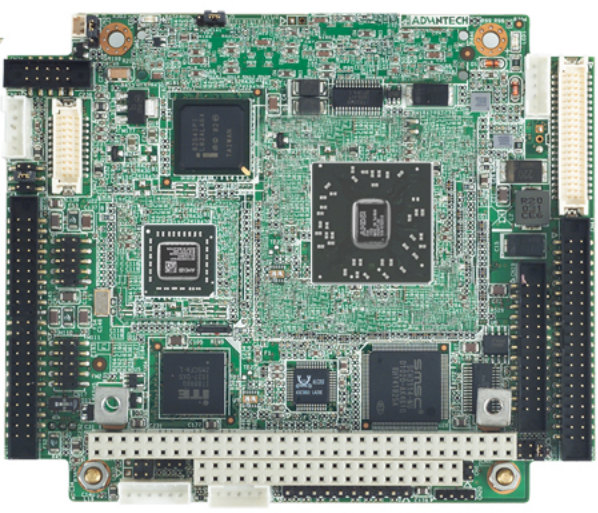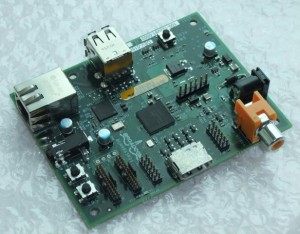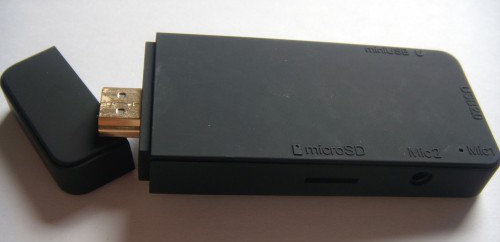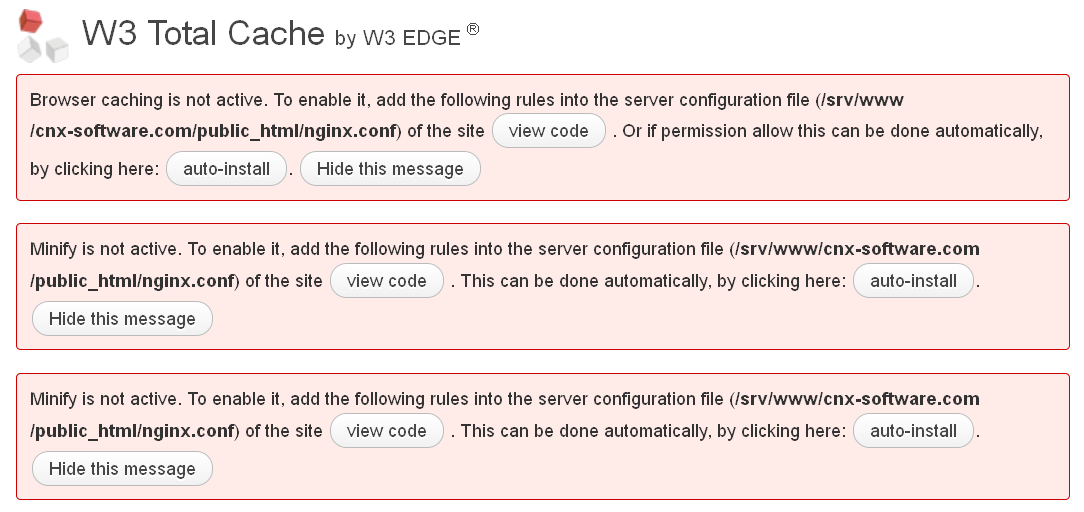I attended BarCamp Chiang Mai 5 last week-end, and a lot of sessions were related to project management, business apps and web development, but there were also a few embedded systems related sessions dealing with subjects such as Arduino (Showing how to blink an LED…) and IOIO board for Android, as well as some Linux related sessions. The most useful talk I attended was about “GNU Parallel”, a command line tool that can dramatically speed up time-consuming tasks that can be executed in parallel, by spreading tasks across multiple cores and/or local machines on a LAN. This session was presented by the developer himself (Ole Tange). This tool is used for intensive data processing tasks such as DNA sequencing analysis (Bioinformatics), but it might be possible to find a way to use GNU Parallel to shorten the time it takes to build binaries. Make is already doing a good job at […]
webOS Community Edition Release for HP TouchPad
Open webOS 1.0 is planned to be released in September 2012, but in the meantime, the development team has released an intermediate webOS “Community Edition” for the HP TouchPad. This code is different from the Open webOS project, and is composed of additional components from the current release of webOS for the TouchPad. The open webOS project team has been working with WebOS Internals to bring this release out for legacy TouchPad devices. Thanks to the release of the webOS Community Edition, it is now possible to learn how the TouchPad works, modify your TouchPad experience and then apply that to Open webOS 1.0 once it is released. The Community Edition only supports HP TouchPad, whereas Open webOS 1.0 release will enable the community to port webOS to different hardware platform, and add more features by using open source stacks such as BlueZ bluetooth and GStreamer. You’ll need to download […]
Linaro 12.06 Release with Kernel 3.5 and Android 4.0.4
Linaro has released version 12.06 based on Linux Kernel 3.5-rc3 and Android 4.0.4 (r2.1). This release brings further multimedia enablement for Android as well as some improvement to perf for Android, improved instructions & scripts for multi-arch on Ubuntu, and lots of little improvements and bugs fixes. Here are the highlights of the release: Android Multimedia enablement on AOSP, patches are in review. Most of the benchmarking applications have been automated via Monkeyrunner, working on PandaBoard and Snowball. Update panda-ics-gcc47-tilt-tracking-blob build to the TI LT 3.4 kernel. USB camera preview and still capture forward ported to tilt-tracking. 3D graphics and multimedia working on tilt-stable. IOMMU for Origen’s Multi format codec (MFC) enabled. IOMMU for Origen’s FIMC enabled. (FIMC stands for Fully Interactive Mobile Camera, and it’s used for camera input). Snowball upgraded to Android 4.0.4. Cortex strings landed in Linaro Android and submitted to AOSP (https://android-review.googlesource.com/#/c/38031/). This is part of […]
AMD Introduces AMD G-T16R G-Series APU with 2.3 Watts Power Consumption
AMD has unveiled another APU in its Embedded G-Series processor family with the AMD Embedded G-T16R, which aims to provide a more powerful (up to 3x) and less power-hungry (7% less) replacement to AMD Geode LX processors. The AMD G-T16R is targeted at very low power, small form factor and cost-sensitive embedded designs. The company claims the processor consumes about 2.3 watts on average or 4.5 watts thermal design power (TDP). This new AMD embedded processor targets industrial control, point-of-sale, medical appliance and transportation markets. As with the other G-Series platforms, the G-T16R can fit into small form factor boards by implementing a two-chip platform: APU + controller hub. AMD G-T16R is clocked at 615MHz, features a Radeon HD 6250 GPU and supports 1920×1200 resolution via VGA, single link DVI and DisplayPort 1.1a video outputs. It can also output 1080p via HDMI and LVDS. The APU supports Windows Embedded Compact […]
List of 39 Low Cost Linux Friendly Boards and Products
Dmitry (omgfire), one of my awesome readers, compiled a great tabular list of Linux friendly boards and products that sells for less than $300 US (usually less than $200). This list includes technical details such as the processor, GPU, memory, NAND flash, connectivity, ports, supported Linux distributions… as well as availability and pricing information. There are currently 39 Linux devices in total. The vast majority are ARM based boards, but he also included 2 x86 products by VIA, but those are relatively pricey ($265 and up). Here’s a summary list with SoCs used, links to blog posts and product pages (if available), as well as price information. Raspberry Pi Model B – Broadcom BCM2835 (ARM11) – Blog post (That’s my first post about the R-Pi last year, and the board is much different now) – Product page – Price: $35 + shipping Rikomagic MK802 – Allwiner A10 (Cortex A8) – […]
Monkey, an Open Source High Performance Embedded Web Server
Some time ago, I mentioned 5 web servers (mathopd, thttpd, busybox httpd, boa and lighttpd) suitable for embedded systems (including those featuring no MMU processors) and low end machines. I’ve recently come across Monkey web server, a lightweight open source Web Server for Linux (2.6.29 or greater), which has been designed with focus in embedded devices. Monkey is currently supported on ARM, x86 and x64, although a quick analysis of the source code shows it forks, so it won’t be supported on processors that do not feature a memory management unit (MMU) without modifications. Monkey supports the following features: HTTP/1.1 compliant Virtual Hosts Asynchronous networking model (event-driven) Indented configuration Plugins Support C API Interface Other features through base plugins: SSL Security Log writter Directory Listing Shell: Command line The developers have benchmarked Monkey against busybox httpd and nginx on a now well-know ARMv6 platform: the Raspberry Pi. They used Siege […]
Oval Elephant Android / Linaro mini PC HDMI Stick
Since Rikomagic MK802 and Zero Device Z802 mini PCs have gone viral and started the Android mini PC craze, this type of device has been popping a bit everywhere… The latest interesting device I found is Oval Elephant Mini PC based on AllWinner A10 processor with 1 GB RAM and selling for 71.49 USD. They have appears to have a whooping 11 in stocks now to be shipped on the 3rd of July, but they are also taking pre-orders and if there is enough demand (over 1,000 pieces), the price would go down to 68 USD. The device pictured above is just a prototype, and they have decided to replace the HDMI mini male output by a proper HDMI output (probably male). As I said before I prefer this form factor, especially since you can just connect mini BlueTooth dongles (no sure that one works with Android / Linux though) to […]
Migrating a WordPress Blog from Apache2 to Nginx
This blog is hosted on a Linode VPS with 512 MB RAM and running Ubuntu 11.10. Up until today, Apache2 was the web server, and it worked fine except sometimes, it reached connection and memory limits, and the blog would go offline for a short period of time, especially right after a new blog post. So this week-end, I decided to switch to nginx (pronounced engine-x) web server which is said to use less memory than Apache2. Let me know if something suddenly stopped working… nginx is a relatively recent web server, and the documentation on the web seems to become outdated pretty fast, so I’ve decided to document what I’ve done. The first thing I would recommend is to try it in your own local server first, and make sure most things are working including plugins. Testing your WordPress blog with nginx in a local server I run Ubuntu […]









